- Home
- Ann Jacobs
Gold, Frankincense and Myrrh Page 8
Gold, Frankincense and Myrrh Read online
Page 8
She’d often lain in her bed at night, in the silence of the house, longing for the touch of a man, caressing her own breasts and fingering her own quiff, giving herself physical pleasure while fantasizing about her non-existent lover, or lovers. Lately that fantasy lover had worn Rob Garrick’s all too handsome face and strong body. Putting Rob’s face on her fantasy man, or men, had made her pleasure so much more intense. She had been eagerly anticipating sharing a bed with him.
Anne wasn’t at all sure she was willing to name any man husband again, and to grant to anyone that much authority over her. She knew the freedom of being unconfined by a vow of obedience. In spite of the Puritan talk of marriage being simply a civil contract between equal parties, women still made a public pledge of obedience to their husbands during the legal wedding ceremony.
Primarily, her freedom had given her the opportunity to serve her rightful King by conveying intelligence, and sometimes people, across Solway Firth, either into or from Scotland. The Firth, a navigation channel full of mud flats and quicksand, could be navigated but only by those who knew the way well. Anne held that Solway Firth was utterly symbolic of these treacherous times.
Lady Anne was the last person anyone would think of as a threat to Cromwell’s government. She had been careful in creating that image. Members of the New Model Army had paid her many visits over the last ten years. Cromwell might have silenced many of the Leveler and Digger leadership, yet the underlying dislike for, and jealousy of, people of property and breeding still very much existed in the New Model Army.
Anne had always given gracious hospitality to all soldiers, showing them a kindness far in excess of any they deserved. She had even had that horrible man, Robert Lilburne, the deputy of the former Major-General, as a guest at her dinner table and shared the family pew for Sunday morning chapel services when he had been out with his men on an inspection tour of the coastline. Anne was overjoyed that the Major-General system had been disbanded. She was only sorry that Cromwell had compromised on that abomination in order to be named Lord Protector for life. Then he’d been installed in that office with all the pomp of a royal coronation. That compromise had been the trading of a smaller evil for a much larger one.
With another sigh, she thought that at least her dear Anthony had been spared the last ten years of social upheaval. It would have killed him to have had to sit quietly by as a rebellious Parliament had murdered his King. The abolition of the House of Lords would have disturbed him to the point of violence. He wouldn’t have been able to take that odious oath of allegiance to the Parliament that declared England didn’t need either King or the House of Lords.
Anthony would have found it painful in the extreme to watch the Church he loved be ruthlessly plundered—both with its clergy stripped of office, and its property seized and sold. Anthony wouldn’t have been able to bear the idea of that copper-nosed monster, Oliver Cromwell, becoming King in everything except name. Certainly, he would have come to blows with Lilburne.
Absolutely, Anthony would have resisted the insulting and illegal Decimation Tax that had confiscated one tenth of all the property and other wealth of the supporters of the Stuarts. That bit of resistance would have resulted likely in both his death and the confiscation of the estate. These last few years had been terrible times. But Hepburn Hall had made it through all of this relatively unscathed.
Now she had orders from her rightful King, orders that no monarch should ever give to a virtuous woman. She had immediately burnt that letter. But nothing could erase the words from her mind.
With a heavy sigh, she finished pouring the last of the ten bottles of elderberry wine into the large crock containing the fever-reducing herbs. She covered it with the heavy lid. Twelve hours of steeping were now required to finish her tonic.
Her stock of tinctures and tonics had been nearly exhausted before they had begun working today, having been hit hard in the treating of many of her tenants. She and the maids had spent most of today replenishing those so that the sick could get some relief. It was the lady’s duty to see to the health and well-being of both her household and tenants.
Duty. Seemed that all her life had centered on duty. Duty to her parents, then to her husband, then to safeguard the estate in order to hold it for her son John, and always her duty to her King. That Charles Stuart, rightful king that he was, should command this of her filled her with rage. For her to follow this command would make her little more than a lying whore, trading her body for information useful to the Crown. To treat marriage as an instrumentality for gathering information seemed, well, sacrilegious, at the least.
She sighed heavily again.
“My Lady?” Bertha asked in concern. “Are you well?”
“Nothing more than a heavy heart, Bertha,” Anne replied, knowing that she was showing too much emotion in front of the servants. While they were loyal to her, it was never a good idea to wear one’s emotions for all to read. “You are right, this fever that has swept the tenants does resemble the one that took Lord Anthony and the twins. Already fifteen people have died. I suspect there will be many more people dead before the fever runs it’s course in another week or so. It is worrisome. Praise God that this has not yet hit the house.”
“Aye, milady,” Bertha answered, her voice gentle. “We are almost done here. Mayhaps you would like to go rest now? It would do no one any good for you to wear yourself out and become ill. A glass or two of elderberry cordial would do nothing except protect you from the fever and gladden your heart.”
“Bertha, you’ve mothered me since I came to this house,” Anne dismissed.
“Aye, but you were such a young slip of a lass when you wed His Lordship,” Bertha replied with a smile. “A body couldn’t help but mother you. A strong wind could have blown you away.”
Anne, Nan to her friends, Lady Solway to her inferiors, had come to Hepburn Hall on the day after the sixteenth anniversary of her birth. She and Anthony had wed by proxy before her father and relatives had begun the trip from Summerfield to bring her to Hepburn. Even though they were already legally wed, on the day of her arrival, Anthony had arranged for the marriage liturgy to celebrate that day in the village church. The Church had been filled with flowers and with well-wishers. Everyone had wanted a look at the Earl’s lady.
The marriage between herself and then twenty-two year old Lord Anthony Hepburn had been arranged by their fathers shortly after her birth. Anthony had been her third cousin on her mother’s side. Yet, she had loved Anthony from the first moment she had seen him. John, the present Earl of Solway, had been born a year from the consummation of their marriage. The love between Anthony and herself had only grown deeper during the years of their marriage, until his untimely death from fever a decade ago.
Anne forced a smile in return. “You’re a good woman, Bertha Davies.”
Bertha looked flustered. “I can finish this myself. Mary, pour milady an elderberry cordial and see her made comfortable. She’s been on her feet all day working here,” Bertha said decisively.
Anne, knowing it was useless to argue with the family retainer, left the stillroom. She went to her sitting room and sat at her writing desk. Retrieving Rob’s letter, she read once more his letter containing his proposal of marriage.
Dearest Cousin Nan, Anne read silently. Long you have known of my deep regard and affection for you. It is with a hopeful heart that I now ask you if you will be my wife, my life, my love, my all. Pray, take time to think this over and do not dismiss it out of hand. We have been friends for many years and now it is time for us to become far more than friends and cousins-in-law. My man will remain at Hepburn Hall in your service until you are ready to send him back to me with a reply.
I borrow the words of the late Thomas Carew, as they express my feelings for you so well.
‘Give me more love or more disdain; The torrid, or the frozen zone, Bring equal ease unto my pain; The temperate affords me none; Either extreme, of love, or hate, Is sweeter than a calm est
ate. Give me a storm; if it be love, Like Danae in that golden show’r I swim in pleasure; if it prove Disdain, that torrent will devour My vulture-hopes; and he’s possess’d Of heaven, that’s but from hell releas’d. Then crown my joys, or cure my pain; Give me more love, or more disdain.’
I could say it no better. We will, I believe, suit and serve one another quite well. We could be one another’s all. I would find nothing else more precious in my mind than to have your love and to call you wife. I long to hold you within my arms, to be truly husband to you.
I pray you think about this and send me the answer I long to hear. Your humble and loving servant, Rob Garrick.
While reading the missive, Mary came in with a tray containing two stemmed glasses and a bottle of elderberry cordial. The maid poured the elderberry liqueur into a small glass and presented it to Anne. “Milady,” Mary said.
“Thank you, Mary. You may go about your duties,” Anne told the maid.
Mary curtseyed and left the room.
How in the world the king had heard of this proposal of marriage was beyond her. She had told no one. The letter had arrived with Rob’s own seal impressed in the intact wax. All she could think is that Rob had told someone that he was intending to remarry. Few things traveled faster, even between England and the continent, than did gossip. Yet if the king’s sources were that good, then why did he desire to place her in Rob’s household? None of this made much sense to her. But then again, it didn’t have to make sense to her. She had a royal command before her. Her only decision was whether to obey it or to become a traitor.
Now, there was a choice. Be a traitor to her rightful king, or to enter a marriage knowing that it was for the purpose of betraying her husband’s trust. Nothing less than her life and honor hung in the balance either way. Either way, she would have to betray someone.
Anne sighed, then sipped her liqueur. This cordial had been bottled last autumn. It had mellowed into a smooth, delightful drink. She finished the one glass of the liqueur and poured herself a second.
She supposed, upon reflection, that this command of the king’s was no worse than his ordering hundreds of men into battle knowing that many of them would not return. A woman’s way of warfare was simply different than a man’s. There was no doubt that this was war between her rightful king and the rebellious Parliament that had murdered the late king. Neither could there be much doubt that Rob had picked the wrong side of this conflict when he had chosen to ally himself with Cromwell instead of his king.
She sighed again. Many people had chosen to make the best of this terrible time. Perhaps, just perhaps, Rob had made that same decision; to do the best he could within the political necessities of the time, to serve his nation and to try to maintain order in a disorderly time. She didn’t want to judge him. Yet, she knew that until he proved himself, she could not trust him.
Anne finished the second glass of cordial. She poured herself another half glass.
Marriage. Ten long years had passed since she had known the comfort of a man’s embrace, or the thrill of a man’s kiss. The loneliness was difficult to bear. Working herself until she nightly fell exhausted into bed didn’t make her chamber any the less solitary when the great clock chimed three in the morning. At thirty-one, soon to be thirty-two, Anne was no longer beautiful in the way of a maiden. Bearing and nursing three children had changed her figure from youthful slimness to a mature, more rounded, state. Then again, she had been blessed with sparkling green eyes, deep chestnut hair, a fair complexion, good bones, and a healthy respect for herself. She wore her maturity with dignity.
She had almost convinced herself to answer Rob’s proposal with an affirmative, even before this order from the king, in spite of their political and religious differences. Rob was not in Cromwell’s closest circles, but he was near enough to power for the rightful king obviously to believe a spy in Rob’s household to be useful. Rob had been among those dismissed from Parliament at the time of Pride’s Purge. He had nothing to do with the unjust trial and murder of Charles I by the Rump Parliament. Yet Robert had served again in the first and second Protectorate Parliaments. He wouldn’t have been in that position if he hadn’t possessed definite Calvinist leanings.
There were certainly worse men she could take to her bed. He really wasn’t hard to look at. In truth, he was one of the most handsome men she had ever known; tall, dark hair he wore long and curled in the style of the day or pulled back in a queue, dark eyes that could sparkle with joy or blaze with anger, muscular as only a man trained and well-practiced in the arts of war could be muscular. He had the hard thighs and strong legs of a horseman and the shoulders and arms of a skilled swordsman. Nan wondered if he still sported the mustache which had adorned his handsome face the last time she saw him.
Rob Garrick was four years older than herself. They were related in law as his late wife had been her first cousin Jane who had been like a sister to Anne. He had been absolutely devoted to Jane during the thirteen years of their marriage. And Jane, according to her letters, had found nothing to complain about in their marriage—in his bed or away from it. Anne had always thought it was such a shame that none of Rob and Jane’s six children had survived. Rob had been a widower now for over a year. Anne genuinely liked Rob. With time, she knew that she could come to love him. But these weren’t normal circumstances, and time was an illusion. Love would likely have little to do with this marriage.
There would always be walls between them. Trust wasn’t going to be possible. She would have to have his trust. But, she could never give him her own, although she would have to pretend otherwise. This would not be much of a marriage. Yet, to the world, it would have to be a perfect marriage. To Rob’s eyes, it would have to be a perfect marriage. She could give no sign that everything wasn’t normal between them.
She removed a sheet of paper from a drawer of her desk. Then she took a pen knife in hand.
As she was sharpening the goose quill in order to reply to Rob, she mulled it over, one more time. King’s command or not, to purposefully abuse Rob’s trust, to be ultimately disloyal to a man with whom she would share bed and board, was something she didn’t know she could do. If she undertook this venture, she would be committing fraud as she was entering this marriage with the full intention of betraying his confidence. Yet, in the scope of greater duty, there was no help for this. Anne didn’t know if she could be good enough of an actress to be able to live a double life to this extent.
Yet, if she did this, she would have to be a superb actress. No one could ever have the slightest hint that she was anything other than Rob’s devoted wife. Nothing less than her life would hang in the balance. Cromwell’s government would label as “treason” what she had been ordered to do. The penalty for treason was death, usually by horrible means. She would be placing both herself and Rob at hazard, if she were discovered acting as an agent of the king. Quite likely, she would endanger her son John as well. The dangers were obvious and overwhelming. Yet, except for endangering Rob, these were the same dangers she had faced every day of her life since she had begun this quiet resistance to the tyranny of Oliver Cromwell. They were familiar dangers.
If Rob caught any sign of her acting in any way outside of the scope of her duties as his wife he would be within his rights to beat her seriously, even to death. Rob had never laid a hand on Jane in anger. Yet, Jane had been the pattern-card for an obedient wife. To abuse those weaker than himself wasn’t Rob’s normal way of operating. But he was a strong man. Anne couldn’t totally ignore the very real possibility. There was danger here.
The full ramifications of this royal command set her head to spinning. Or maybe that was simply a side effect of the liqueur.
John, her son, the current Earl of Solway, came into the room. He looked more like his father every day. She had seen the way some of the local girls looked at him. They were looking at him as though he were a man. She supposed that was not so unusual. His beard had begun to grow, although it was still rath
er sparse, and he was shaping up to be a fine looking man. At fourteen, soon to be fifteen, he was old enough to cross over into Scotland and take a bride. Now, there was a thought that made her feel positively ancient.
He’d obviously been out working with the men today. There were times she still looked at John and saw a small lad in skirts. Granted, he had assumed most of the day- to-day supervising of the estate. This was his heritage from his father, grandfather, and all the Hepburns back to the first Earl of Solway who had been created in Stephen’s court after the settlement of the civil war against Maud.
Hepburn Hall, the estate, was her son’s legacy, his property, his future. Caring for his people was his duty. Yet, he was in many ways still a boy. Anne hated to see him grow up too fast. Still, she knew her son; he longed to be a man, to be treated as a man. So she tried to do so. In that regard, she had taken to addressing him by his title, instead of his Christian name, as most people in his life would address him as Solway.
She sighed and offered. “I wish that while this fever is running through the tenants you wouldn’t expose yourself to it, my dear.”
John smiled at her. “Mother, there is a certain amount of work to be done at all times. That there are men ill only makes that much more work for all of us who are healthy. I’m healthy as a horse.”
“Have a glass of the elderberry cordial, Solway,” Anne ordered softly. “It’s medicinal. The elderberries have a strengthening effect on the lungs. And you will need that fortification if you are resolute in your desire to continue to work with the men.”

 On the Trail of Darkness
On the Trail of Darkness A Gift of Gold
A Gift of Gold Eternal Surrender
Eternal Surrender Perfect Master
Perfect Master Lawyers in Love 03 Mastered
Lawyers in Love 03 Mastered Luna Ten #1: Cassiopeia
Luna Ten #1: Cassiopeia Her Alien Masters
Her Alien Masters RopedHitchedandLassoed
RopedHitchedandLassoed SwitchingControl
SwitchingControl Jake's Love (Courthouse Connections, #7)
Jake's Love (Courthouse Connections, #7) The Rookie (Calling the Signals Book 1)
The Rookie (Calling the Signals Book 1) Her Very Special Robot
Her Very Special Robot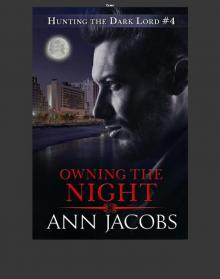 Owning the Night
Owning the Night Gold, Frankincense and Myrrh
Gold, Frankincense and Myrrh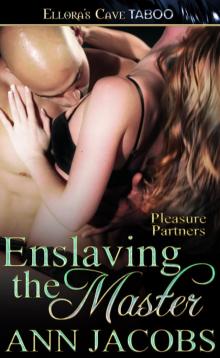 Enslaving the Master
Enslaving the Master LoversFeud
LoversFeud Wild One: 3 (Caden Kink)
Wild One: 3 (Caden Kink) PleasureSlave
PleasureSlave Best Reception
Best Reception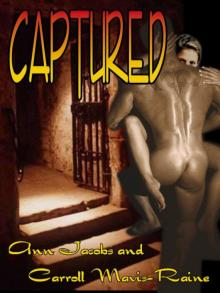 Captured
Captured Loving Control
Loving Control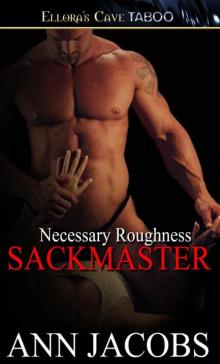 Sackmaster
Sackmaster Unexpected Control
Unexpected Control NoBounds
NoBounds In His Own Defense
In His Own Defense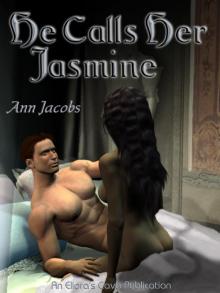 He Calls Her Jasmine
He Calls Her Jasmine LawyersinLove_Bundle
LawyersinLove_Bundle PrimeDefender
PrimeDefender Pleasure Slave
Pleasure Slave Forward Pass
Forward Pass